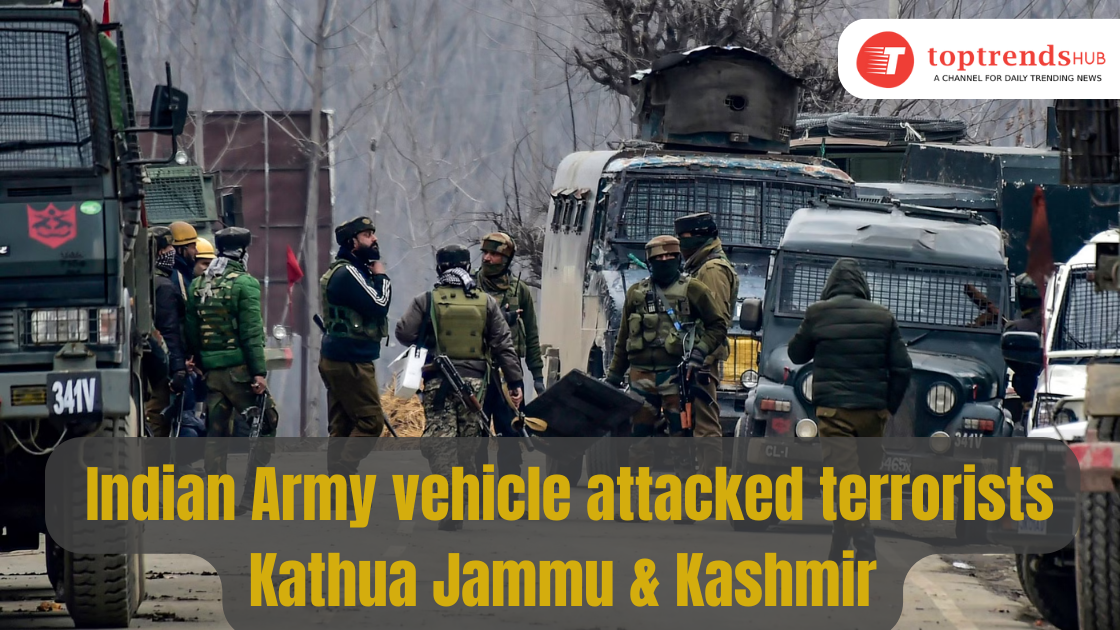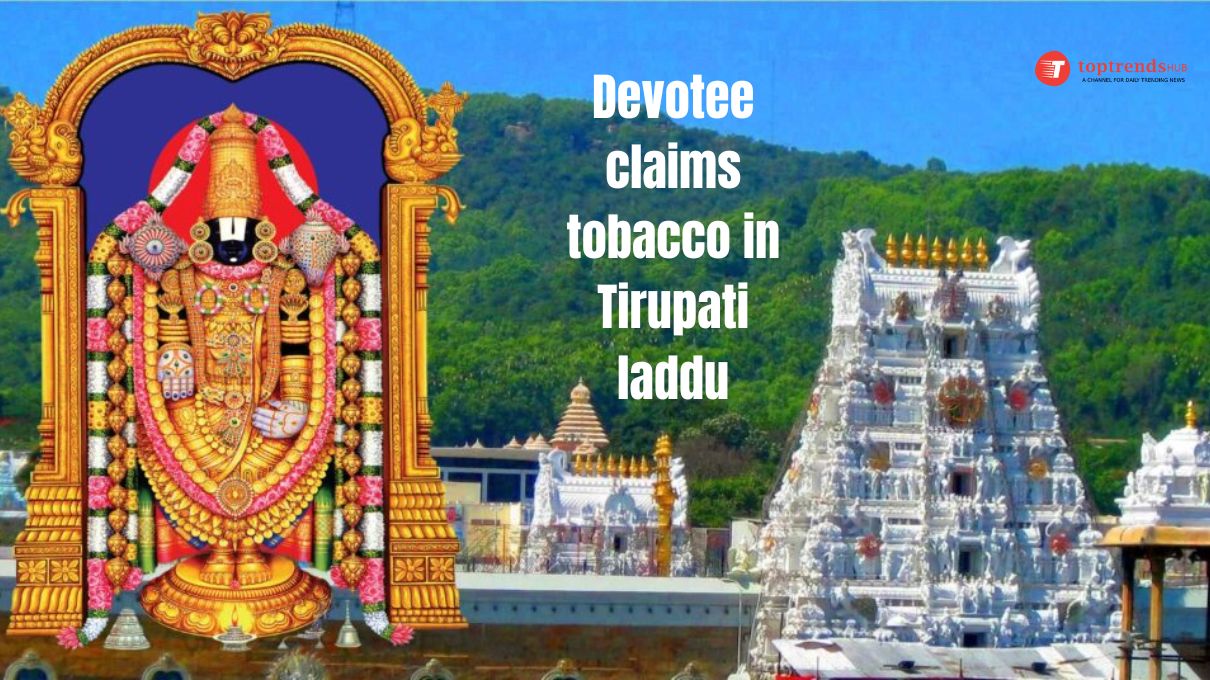On 8 July 2024, Indian Armya brutal terror attack in Jammu and Kashmir’s Kathua district claimed the lives of five Indian soldiers. The assailants, identified as Pakistani terrorists, targeted an Indian Army truck, employing firearms and grenades to inflict maximum damage. This incident, part of a broader pattern of violence in the region, underscores the persistent threat of cross-border terrorism. This detailed analysis explores the specifics of the attack, the involvement of terrorist groups, the immediate and long-term responses from Indian security forces, and the broader implications for regional security.
The Attack
The ambush occurred around 3 PM between Bhimber Gali and Kathua in the Rajouri sector. The terrorists took advantage of heavy rain and low visibility to launch their attack. They fired upon the truck and threw grenades, causing it to catch fire and resulting in the death of five soldiers: Havaldar Mandeep Singh, Lance Naik Debashish Baswal, Lance Naik Kulwant Singh, Sepoy Harkrishan Singh, and Sepoy Sewak Singh.
The terrorists struck in the Machedi area in Billa war from atop a hill. They hurled grenades at the army vehicle, aiming to maximize casualties. The assault happened on the Machedi-Kindli-Malhar road near Badnota village in Lohai Malhar, about 150 km from Kathua town, around 3:30 pm. Among the five personnel killed was a Junior Commissioned Officer (JCO). Five other soldiers sustained injuries and required hospitalization.
In Short
- Five personnel were killed as terrorists ambushed an army vehicle
- Terrorists used advanced weapons, conducted recce
- Large-scale manhunt for attackers underway in Kathua
The Attackers
The attackers were identified as members of Pakistani nationalist groups, specifically linked to Jaish-e-Mohammed (JeM) and Lashkar-e-Taiba (LeT). Intelligence reports indicated that seven terrorists from two separate groups coordinated the attack. They infiltrated from Pakistan-occupied Kashmir (PoK) via the Rajouri and Poonch sectors. The terrorists received support from local over-ground workers (OGWs) affiliated with JeM and LeT.
Immediate Response
Following the attack, a massive search operation was launched to apprehend the terrorists. Security forces, including the Army, state police, and the Central Reserve Police Force (CRPF), cordoned off the area. Drones, sniffer dogs, and a Bomb Disposal Squad were deployed to assist in the search. Senior officers from the Jammu division, including Additional Director General of Police (ADGP) Mukesh Singh, were present at the site.
National Investigation Agency (NIA) Involvement
The National Investigation Agency (NIA) has dispatched two teams, including forensic experts, from Delhi to Poonch for a comprehensive investigation. Known for probing high-profile terror attacks, the NIA is expected to scrutinize the attack’s planning, execution, and support mechanisms.
National and International Reactions
The attack drew widespread condemnation from various political leaders and the international community. Defence Minister Rajnath Singh expressed deep anguish over the loss of lives and emphasized the determination of the Indian Army to ensure peace in the region. He stated, “I feel deeply anguished at the loss of five of our brave Indian Army Soldiers in a terrorist attack in Badnota, Kathua (J&K). My deepest condolences go to the bereaved families.
The nation stands firm with them in this difficult time. Counter-terrorist operations are underway, and our soldiers remain determined to usher in peace and order in the region. I pray for a speedy recovery to those who sustained injuries in this dastardly terror attack.”
Congress chief Mallikarjun Kharge, former chief ministers Omar Abdullah of the National Conference, Mehbooba Mufti of PDP, and Ghulam Nabi Azad also condoled the loss of lives and expressed concern over the security situation in the region
The Terror Landscape in Jammu and Kashmir
Indian Army
The Poonch attack is part of a broader pattern of terrorist activities in Jammu and Kashmir. The region has been a hotspot for terrorism, with groups like JeM and LeT frequently targeting Indian security forces and civilians. In January 2023, militants killed seven civilians in twin attacks in Rajouri’s Dangri village. The Poonch attack is the first major incident targeting security forces in 2024 and comes just ahead of the G-20 meetings scheduled to be held in Srinagar.
Terrorism in Jammu and Kashmir
This attack marks the fifth terror incident in the Jammu region within a month, underscoring the persistent threat of terrorism in the area. The use of advanced weapons and tactics indicates a high level of planning and coordination by the terrorist groups involved. This pattern of violence emphasizes the ongoing challenges faced by Indian security forces in maintaining peace and stability in Jammu and Kashmir
Intelligence and Security Challenges
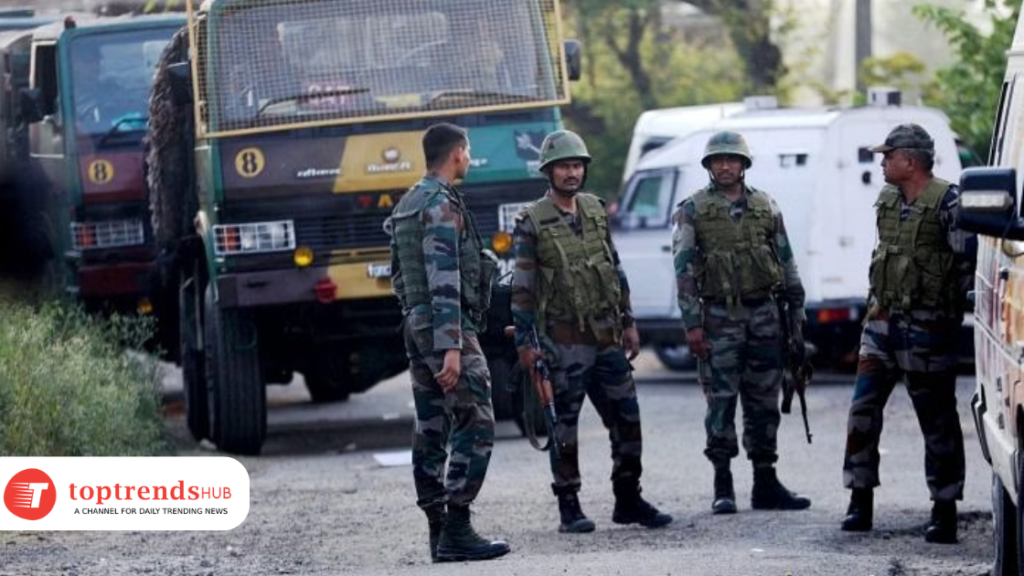
Indian Army
Former Jammu and Kashmir police chief Shesh Paul Vaid noted that there were intelligence inputs suggesting the possibility of a major terror attack in view of the G-20 meetings. The attack’s timing and execution highlight the challenges faced by Indian security forces in anticipating and preventing such incidents. Despite continuous vigilance, the rugged terrain and dense forest cover in regions like Rajouri and Poonch provide cover for infiltrating terrorists.
Advanced Weaponry and Reconnaissance
Sources revealed that the terrorists used sophisticated weapons, including M4 Carbine rifles and explosive devices, to execute the attack. The attackers had conducted reconnaissance of the area, likely with the help of local supporters, indicating a well-planned assault.
Two to three terrorists and one to two local guides took positions atop hills. They lobbed grenades at the army vehicles and then fired at them. The driver became the first target, similar to previous terror attacks, sources told India Today. A local guide assisted the terrorists in conducting reconnaissance and provided them with food and shelter. After the attack, the guide helped them reach their hideouts
Regional Security Dynamics
The ongoing violence in Jammu and Kashmir has significant implications for regional security. The infiltration of terrorists from PoK indicates continued support and safe havens provided by Pakistani authorities. The use of sophisticated tactics, such as combining gunfire with grenade attacks, points to high levels of training and planning by terrorist groups. This raises concerns about the potential for future attacks and the need for enhanced counter-terrorism measures.
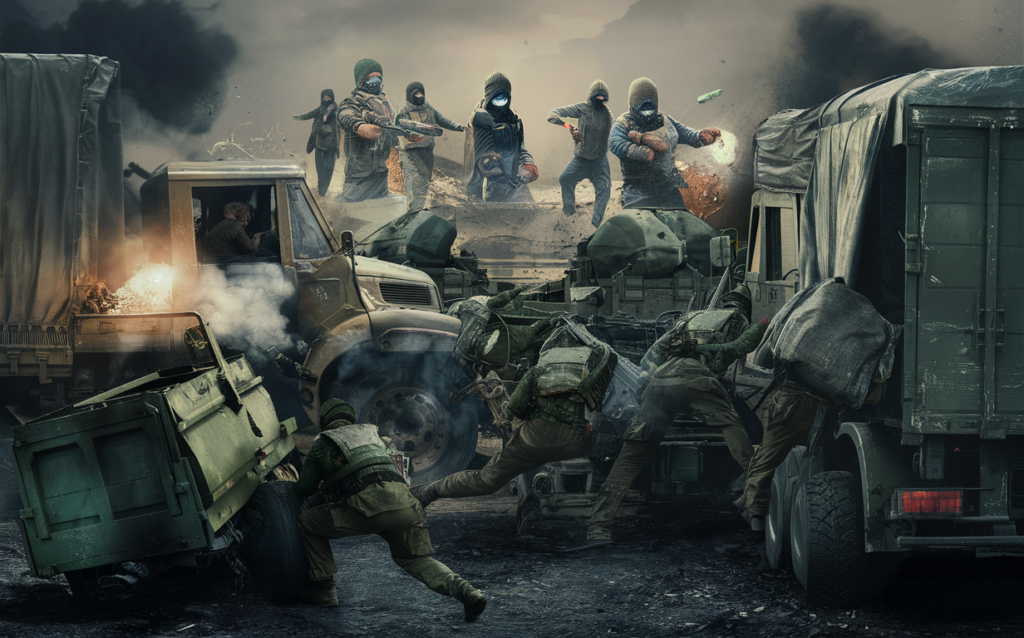
Government and Military Response
The Indian government has condemned the attack and reiterated its commitment to combating terrorism. Chief of Army Staff General Manoj Pande paid tribute to the fallen soldiers and emphasized the importance of vigilance and preparedness. The government has also vowed to take stringent measures against terrorist groups operating from Pakistani territory. Diplomatic channels are being utilized to press Pakistan to take action against these groups and their support networks.
Government and Military Strategy
In response to the attack, the Indian government reiterated its commitment to combating terrorism and ensuring the safety of its citizens. Enhanced security measures, including improved intelligence gathering and sharing, increased cross-border surveillance, and international cooperation, are being implemented to prevent future attacks. The Indian Army and security forces continue to conduct counter-terrorism operations to neutralize threats and secure the region
Immediate Response and Combing Operation
Following the attack, a massive combing operation commenced in Kathua to track down the attackers. Security forces, including the Border Security Force (BSF) and the Indian Army, deployed to the area. However, the challenging hilly terrain, fog, and dense vegetation posed significant hurdles in the search operation. Despite these difficulties, efforts to locate the terrorists who fled to nearby forest areas continued
Impact on G-20 Meetings
The Poonch attack occurred just ahead of the G-20 meetings scheduled to be held in Srinagar. The Indian government has been keen to showcase Jammu and Kashmir as a region open for business and tourism. However, the attack highlights the persistent security challenges and the need for robust measures to ensure the safety of delegates and participants. We expect enhanced security protocols and increased surveillance leading up to the meetings..
The Human Cost
The Poonch attack that claimed the lives of five soldiers starkly reminds us of the human cost of terrorism.These soldiers, who served in the Rashtriya Rifles unit, played an active role in counterinsurgency operations aimed at maintaining peace and security in the region.
Their sacrifice highlights the bravery and unwavering dedication of Indian security forces in confronting ongoing threats.
Long-Term Strategies
In the wake of the Poonch attack, there is a renewed focus on long-term strategies to combat terrorism in Jammu and Kashmir. This includes improving intelligence gathering and sharing, enhancing cross-border surveillance, and increasing cooperation with international partners.
The Indian government also plans to enhance its counter-terrorism capabilities by providing advanced training to security forces and acquiring modern equipment.
Long-Term Implications for Regional Security
The attack in Kathua has significant implications for regional security. It highlights the need for continuous vigilance and robust counter-terrorism strategies to address the evolving tactics of terrorist groups. The involvement of local guides and supporters underscores the importance of community engagement and cooperation in counter-terrorism efforts. As the region prepares for significant international events like the G-20 meetings, ensuring security and stability remains a top priority for Indian authorities
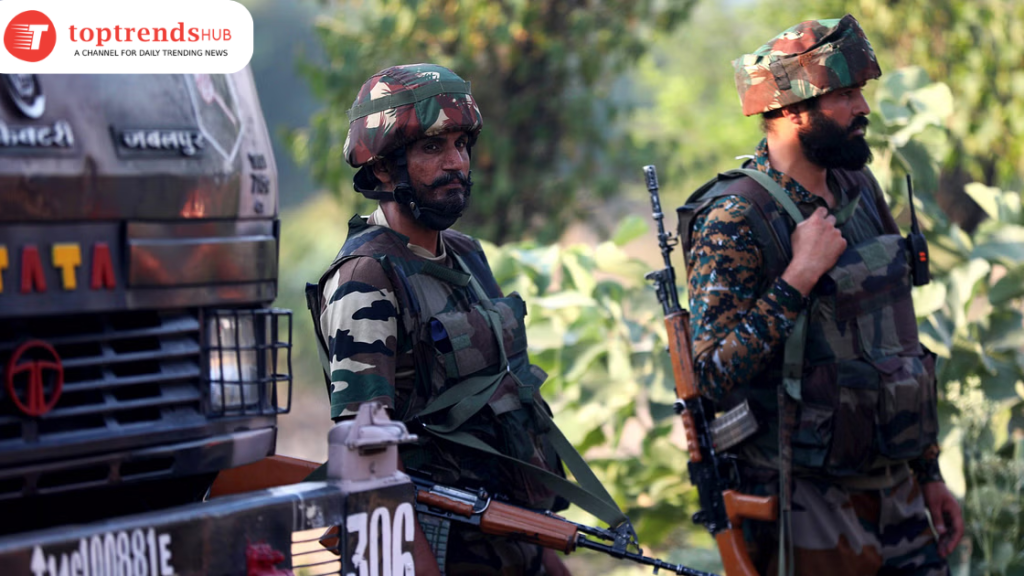
Conclusion
The terror attack in Poonch is a grim reminder of the ongoing security challenges in Jammu and Kashmir. It highlights the need for continuous vigilance, robust intelligence, and coordinated efforts to counter terrorism. As the region prepares for significant international events like the G-20 meetings, ensuring security and stability remains a top priority for Indian authorities.
We will not forget the sacrifices of the fallen soldiers, and their bravery will inspire ongoing efforts to achieve lasting peace in the region.
The terror attack in Kathua serves as a stark reminder of the ongoing security challenges in Jammu and Kashmir. It underscores the need for continuous vigilance, robust intelligence, and coordinated efforts to counter terrorism. As the region prepares for significant international events like the G–20 meetings, ensuring security and stability remains a top priority for Indian authorities.



